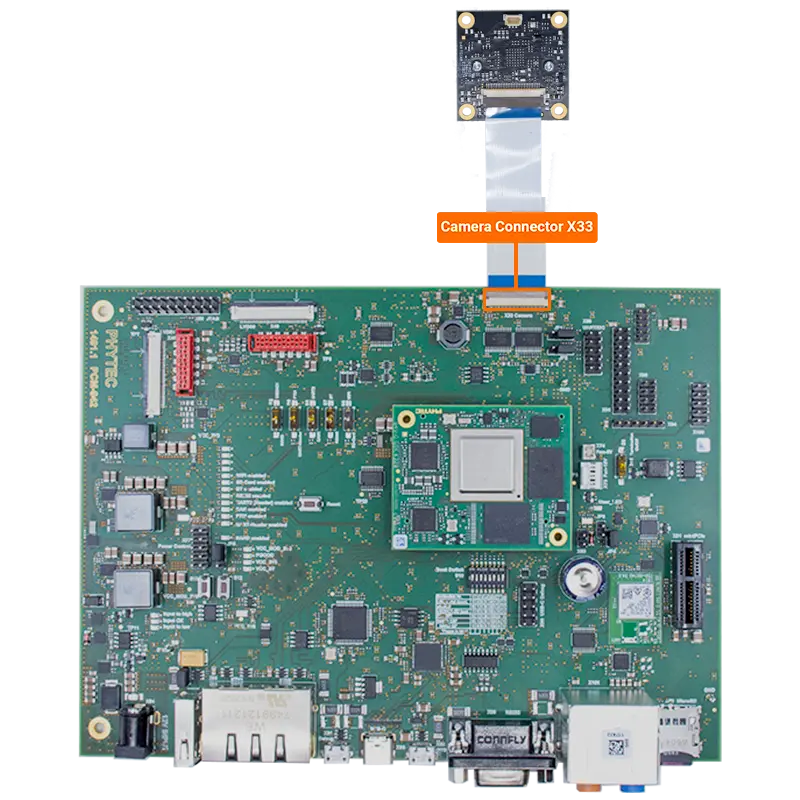Parallel Camera
This guide will show you how to connect and use the VM-011-COL-M12 phyCAM-P module on the phyCORE-i.MX8X development kit.

Requirements
Hardware Setup
With the board powered off, connect the phyCAM-P module to the camera connector (X33) on the carrier board.
Power on the development kit and stop in U-Boot.
Load the device tree overlay required for the parallel camera interface and then boot the board
Target (U-Boot)setenv overlay_files phytec-imx8qxp-parallel-camera.dtbo boot
Picture Time!
To capture a JPEG, use the following gstreamer pipeline.
Target (Linux)gst-launch-1.0 v4l2src device=/dev/video0 num-buffers=1 ! 'video/x-bayer, format=grbg, width=2592, height=1944' ! bayer2rgb ! videoscale ! 'video/x-raw, width=259, height=518' ! jpegenc ! filesink location=snap.jpeg
Expected OutputSetting pipeline to PAUSED ... Pipeline is live and does not need PREROLL ... Setting pipeline to PLAYING ... New clock: GstSystemClock [ 340.554739] bypass csc [ 340.557115] input fmt RGB4 [ 340.559885] output fmt GRBG Got EOS from element "pipeline0". Execution ended after 0:00:02.391455375 Setting pipeline to PAUSED ... Setting pipeline to READY ... Setting pipeline to NULL ... Freeing pipeline ...
Viewing the Image
There are a few options to view the image.
Capacitive Touch Display (LCD-018-070-KAP)
Using the LCD you can display the image on the LCD using the built in weston software.
Note
Either tap the “X” on the LCD display picture window or press “ctrl+c” to return to normal console usage.
Once the following command is run you should see your picture on the display.
Target (Linux)weston-image snap.jpeg
Note
The ‘weston-image’ utility will display the image to the LVDS0 interface by default.
Local Network
If you do not have a display, you can use a local network and copy the file from the development kit to your host machine (Linux/Ubuntu).
Connect the development kit to your local network using eth0 or eth1.
Find the given ip address using “ifconfig” command.
Target (Ubuntu)ifconfig
Expected Outputeth0 Link encap:Ethernet HWaddr 3e:c0:4b:d9:5e:fe inet addr:<your_ip_address> Bcast:<your_bcast_address> Mask:255.255.255.0 inet6 addr: fe80::3cc0:4bff:fed9:5efe/64 Scope:Link UP BROADCAST RUNNING MULTICAST MTU:1500 Metric:1 RX packets:6983 errors:0 dropped:1511 overruns:0 frame:0 TX packets:65 errors:0 dropped:0 overruns:0 carrier:0 collisions:0 txqueuelen:1000 RX bytes:2283310 (2.1 MiB) TX bytes:13190 (12.8 KiB) eth1 Link encap:Ethernet HWaddr 22:20:a1:64:cf:ba UP BROADCAST MULTICAST MTU:1500 Metric:1 RX packets:0 errors:0 dropped:0 overruns:0 frame:0 TX packets:0 errors:0 dropped:0 overruns:0 carrier:0 collisions:0 txqueuelen:1000 RX bytes:0 (0.0 B) TX bytes:0 (0.0 B) lo Link encap:Local Loopback inet addr:127.0.0.1 Mask:255.0.0.0 inet6 addr: ::1/128 Scope:Host UP LOOPBACK RUNNING MTU:65536 Metric:1 RX packets:2 errors:0 dropped:0 overruns:0 frame:0 TX packets:2 errors:0 dropped:0 overruns:0 carrier:0 collisions:0 txqueuelen:1000 RX bytes:140 (140.0 B) TX bytes:140 (140.0 B)Use secure copy (scp) on your host machine (Ubuntu/Linux) to copy the file from the development kit to a local directory.
Host Machine Terminalsudo scp root@<devkit_ip_address>:/home/root/snap.jpeg /home/user/Downloads/
Local Machine
View the image from a local machine.
Power off the kit and remove the SD card
Plug the SD card into your host machine and copy the snap.jpeg image from the card to your local machine for viewing.
Make a Video
Note
Video stream capture is not yet supported in this BSP.
Fast enough conversion from the Bayer data output by the camera to RGB requires the use of the ISP (which is not yet supported).